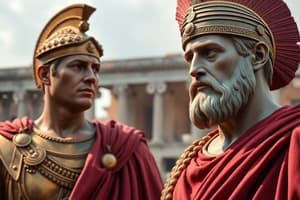Podcast
Questions and Answers
Who was the first Roman emperor?
Who was the first Roman emperor?
- Nero
- Julius Caesar
- Tiberius
- Octavian Augustus (correct)
What term is used to refer to the period of relative peace established during Octavian Augustus' reign?
What term is used to refer to the period of relative peace established during Octavian Augustus' reign?
- Pax Romana (correct)
- Pax Americana
- Pax Britannica
- Pax Sinica
What was a significant aspect of the civil service reforms under Octavian Augustus?
What was a significant aspect of the civil service reforms under Octavian Augustus?
- Only noble families could hold office.
- Paid officials managed government affairs. (correct)
- Civil service positions were abolished.
- Officials were unpaid with voluntary service.
Which of the following industries was considered the most important in ancient Rome?
Which of the following industries was considered the most important in ancient Rome?
What led to the decline of the Roman Empire in the 2nd century AD?
What led to the decline of the Roman Empire in the 2nd century AD?
What was a significant economic factor contributing to the fall of the Roman Empire?
What was a significant economic factor contributing to the fall of the Roman Empire?
How did Diocletian attempt to address the challenges facing the Roman Empire?
How did Diocletian attempt to address the challenges facing the Roman Empire?
What role did mercenaries play in the Roman army's decline?
What role did mercenaries play in the Roman army's decline?
What was one major outcome of Constantine's decision to move the capital to Byzantium?
What was one major outcome of Constantine's decision to move the capital to Byzantium?
Which group played a decisive role in the invasions of the Western Roman Empire?
Which group played a decisive role in the invasions of the Western Roman Empire?
What role did the mountains play in the development of ancient Rome?
What role did the mountains play in the development of ancient Rome?
Which figure is NOT associated with the founding myth of Rome?
Which figure is NOT associated with the founding myth of Rome?
What significant event happened during the childhood of Romulus and Remus?
What significant event happened during the childhood of Romulus and Remus?
What chronological order is correct for the periods of Roman history?
What chronological order is correct for the periods of Roman history?
What influence did the Etruscans have on Rome?
What influence did the Etruscans have on Rome?
What was the primary reason Roman citizens overthrew Tarquin the Proud?
What was the primary reason Roman citizens overthrew Tarquin the Proud?
How long could a Roman consul serve in office?
How long could a Roman consul serve in office?
Which group held the majority of political power in the Roman Republic?
Which group held the majority of political power in the Roman Republic?
What was one of the significant outcomes of the conflict between Patricians and Plebeians?
What was one of the significant outcomes of the conflict between Patricians and Plebeians?
What was the main reason for the Punic Wars?
What was the main reason for the Punic Wars?
Which of the following leaders was associated with Rome during the Punic Wars?
Which of the following leaders was associated with Rome during the Punic Wars?
What role did the tribunes play in the Roman Republic?
What role did the tribunes play in the Roman Republic?
Which major rival was involved in the conflicts known as the Punic Wars?
Which major rival was involved in the conflicts known as the Punic Wars?
What was a significant impact of the mountains on Ancient Greece?
What was a significant impact of the mountains on Ancient Greece?
Which civilization is referred to as the 'Old Greeks'?
Which civilization is referred to as the 'Old Greeks'?
What was a primary reason for Greek colonization?
What was a primary reason for Greek colonization?
What was the Agora in a Greek city-state?
What was the Agora in a Greek city-state?
Which of the following was NOT a consequence of the Dark Age of Greece?
Which of the following was NOT a consequence of the Dark Age of Greece?
Who led the Persian army during the Battle of Thermopylae?
Who led the Persian army during the Battle of Thermopylae?
What was the primary outcome of the Battle of Salamis?
What was the primary outcome of the Battle of Salamis?
What was a significant consequence of the Persian Wars for Athens?
What was a significant consequence of the Persian Wars for Athens?
What effect did the Peloponnesian War have on Greek city-states?
What effect did the Peloponnesian War have on Greek city-states?
What characterized Hellenistic culture?
What characterized Hellenistic culture?
What defines a monarchy within the Greek city-states?
What defines a monarchy within the Greek city-states?
Which group in the Greek city-states was NOT considered to be free people?
Which group in the Greek city-states was NOT considered to be free people?
What was a notable characteristic of Spartan society?
What was a notable characteristic of Spartan society?
Which Athenian reformer outlawed debt slavery?
Which Athenian reformer outlawed debt slavery?
What was one of Pericles' goals for Athens?
What was one of Pericles' goals for Athens?
In Athens, who had the right to participate in the assembly?
In Athens, who had the right to participate in the assembly?
What was one of the reasons for the Trojan War according to legends?
What was one of the reasons for the Trojan War according to legends?
What structure did the Gerousia represent in Sparta?
What structure did the Gerousia represent in Sparta?
Which city captured Troy according to the legends of the Trojan War?
Which city captured Troy according to the legends of the Trojan War?
What was one significant result of Cleisthenes' reforms?
What was one significant result of Cleisthenes' reforms?
What major event preceded the Persian Wars?
What major event preceded the Persian Wars?
What was the outcome of the battle at Marathon?
What was the outcome of the battle at Marathon?
Which of the following statements is true regarding the Peloponnesian War?
Which of the following statements is true regarding the Peloponnesian War?
What was the primary role of the king during the Roman Kingdom period?
What was the primary role of the king during the Roman Kingdom period?
Which of the following best describes the Etruscans?
Which of the following best describes the Etruscans?
How was the succession of kings determined in the Roman Kingdom?
How was the succession of kings determined in the Roman Kingdom?
Which group in the Roman Kingdom had the most rights and held positions in the Senate?
Which group in the Roman Kingdom had the most rights and held positions in the Senate?
Which of the following accomplishments is associated with Ancus Marcius?
Which of the following accomplishments is associated with Ancus Marcius?
What was one significant cause of the crisis in the Roman Republic?
What was one significant cause of the crisis in the Roman Republic?
Which group faced increasing debts and poverty due to agricultural challenges?
Which group faced increasing debts and poverty due to agricultural challenges?
What impact did military service have on landless men in Rome?
What impact did military service have on landless men in Rome?
Who led the notable slave revolt against the Roman Republic?
Who led the notable slave revolt against the Roman Republic?
What reform did the Gracchus brothers propose regarding land ownership?
What reform did the Gracchus brothers propose regarding land ownership?
What was the outcome for the Gracchus brothers after their proposed reforms?
What was the outcome for the Gracchus brothers after their proposed reforms?
Which group was formed to consolidate power among key Roman leaders?
Which group was formed to consolidate power among key Roman leaders?
What was one of Julius Caesar’s policies during his rule?
What was one of Julius Caesar’s policies during his rule?
What was a key characteristic of the Roman Republic's government during the crisis?
What was a key characteristic of the Roman Republic's government during the crisis?
What event followed Julius Caesar's assassination in 44 B.C.?
What event followed Julius Caesar's assassination in 44 B.C.?
Flashcards
Pax Romana
Pax Romana
Period of relative peace in Rome, following Octavian Augustus's reign.
Octavian Augustus
Octavian Augustus
First Roman emperor, bringing Rome's civil service and common currency.
Roman civil service
Roman civil service
System of paid officials managing government affairs, not just the rich.
Roman Empire decline (2nd century)
Roman Empire decline (2nd century)
Signup and view all the flashcards
Roman common coinage
Roman common coinage
Signup and view all the flashcards
Trade disruption
Trade disruption
Signup and view all the flashcards
Coin debasement
Coin debasement
Signup and view all the flashcards
Loss of farmland
Loss of farmland
Signup and view all the flashcards
Mercenaries
Mercenaries
Signup and view all the flashcards
Why did the Germanic tribes invade?
Why did the Germanic tribes invade?
Signup and view all the flashcards
Roman Republic
Roman Republic
Signup and view all the flashcards
Consuls
Consuls
Signup and view all the flashcards
Senate
Senate
Signup and view all the flashcards
Magistrates
Magistrates
Signup and view all the flashcards
Tribunes
Tribunes
Signup and view all the flashcards
Twelve Tables
Twelve Tables
Signup and view all the flashcards
Punic Wars
Punic Wars
Signup and view all the flashcards
Patricians vs. Plebeians
Patricians vs. Plebeians
Signup and view all the flashcards
Italian Peninsula
Italian Peninsula
Signup and view all the flashcards
Romulus and Remus
Romulus and Remus
Signup and view all the flashcards
Etruscans
Etruscans
Signup and view all the flashcards
Roman Kingdom
Roman Kingdom
Signup and view all the flashcards
What were the important features of the geography of Ancient Rome?
What were the important features of the geography of Ancient Rome?
Signup and view all the flashcards
Greek Geography: Mountains
Greek Geography: Mountains
Signup and view all the flashcards
Greek Civilization: Minoans
Greek Civilization: Minoans
Signup and view all the flashcards
Mycenaean Civilization: City-States
Mycenaean Civilization: City-States
Signup and view all the flashcards
Dark Age of Greece: Sources
Dark Age of Greece: Sources
Signup and view all the flashcards
Greek Colonization: Reasons
Greek Colonization: Reasons
Signup and view all the flashcards
Monarchy
Monarchy
Signup and view all the flashcards
Aristocracy
Aristocracy
Signup and view all the flashcards
Oligarchy
Oligarchy
Signup and view all the flashcards
Tyrant
Tyrant
Signup and view all the flashcards
Citizen in Ancient Greece
Citizen in Ancient Greece
Signup and view all the flashcards
Draco's Reforms
Draco's Reforms
Signup and view all the flashcards
Solon's Reforms
Solon's Reforms
Signup and view all the flashcards
Cleisthenes' Reforms
Cleisthenes' Reforms
Signup and view all the flashcards
Persian Wars
Persian Wars
Signup and view all the flashcards
Delian League
Delian League
Signup and view all the flashcards
Peloponnesian War
Peloponnesian War
Signup and view all the flashcards
Hellenistic Culture
Hellenistic Culture
Signup and view all the flashcards
King Philip
King Philip
Signup and view all the flashcards
Large Territory
Large Territory
Signup and view all the flashcards
Discontent Among Lower Classes
Discontent Among Lower Classes
Signup and view all the flashcards
Breakdown in Military Order
Breakdown in Military Order
Signup and view all the flashcards
Loss of Land for Small Farmers
Loss of Land for Small Farmers
Signup and view all the flashcards
Spartacus Rebellion
Spartacus Rebellion
Signup and view all the flashcards
The Gracchi Brothers
The Gracchi Brothers
Signup and view all the flashcards
Gaius Marius's Reforms
Gaius Marius's Reforms
Signup and view all the flashcards
Unstable Government in the Republic
Unstable Government in the Republic
Signup and view all the flashcards
Disloyal Soldiers
Disloyal Soldiers
Signup and view all the flashcards
The First Triumvirate
The First Triumvirate
Signup and view all the flashcards
Trojan War
Trojan War
Signup and view all the flashcards
The Revolt in Ionia
The Revolt in Ionia
Signup and view all the flashcards
Battle of Marathon
Battle of Marathon
Signup and view all the flashcards
Mycenaean
Mycenaean
Signup and view all the flashcards
Etruscan Influence
Etruscan Influence
Signup and view all the flashcards
Roman Kingdom's Government
Roman Kingdom's Government
Signup and view all the flashcards
Who was Tarquin the Proud?
Who was Tarquin the Proud?
Signup and view all the flashcards
Kings of Rome
Kings of Rome
Signup and view all the flashcards
Study Notes
Octavian Augustus
- the first Roman emperor
- the unchallenged ruler of Rome
- titles: Augustus = "exalted one"
- Imperator = "supreme military commander" / = emperor
- the reign of Octavian Augustus started the period of relative peace in Rome → Pax Romana = Roman peace
The reforms:
- he set up civil service
- affairs of the government were managed by paid officials.
- not only rich people could hold the office.
- common coinage was introduced
- silver denarius
- trading became easier
Industry:
- the most important industry was agriculture
- the Romans developed trade with the provinces and other countries.
Trade:
Society:
- people from all over the world lived in the empire
- higher classes lived in luxury
- lower classes were poor and unemployed
- slavery was the significant part of Roman life
- slaves = working in the households as servants or in the fields.
- were entertaining citizens of Rome as trained fighters - Gladiators
The Decline and Fall
- the 2nd century AD - the end of Pax Romana
- the crisis started and the Empire declined
Studying That Suits You
Use AI to generate personalized quizzes and flashcards to suit your learning preferences.




